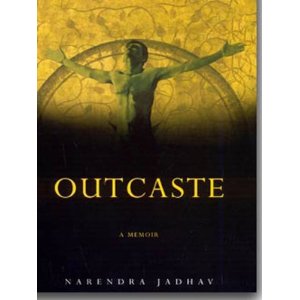Book Review
Outcaste: A Memoir encompasses the voices of three generations of the Jadhav family, beginning with the grandsire and protagonist, Damu Mahar and his wife, Sonu, then goes on to the author himself and ends with the author’s daughter, Apoorva’s perspective. The story begins with Damu, performing the customary Yeskar duties of a Dalit by announcing the arrival of the Mamledar in the event of a mishap.
After the mamledar’s departure when he looksforward towards having his meals, he is told by the Fauzdar to guard the dead body until the policearrives. Damu’s obeisance and hard labour is awarded by abuses, whippings and insults to his mentor and God, BabasahebAmbedkar when he refuses to bend down further to the dictates of the higher caste Fauzdar.
The whippings and the insults damage Damu’s sense of self-respect more than his body and he takes the decision to leave the village forever. The story about his past life unfolds during his journey with his wife towards freedom. The flashback sequences show the trials and travails of his childhood.
Both Damu and Sonu hailed from extreme poverty-stricken agricultural families, and their hardships were augmented by the fact that they were Dalits. They were looked down upon as sub-humans and their shadow was believed to pollute the sanctity of the religious place of worship. But the city life proved to be an eye-opener for Damu who tasted freedom from casteism in his friendship with Robin whom he addressed as Missybaba, understood the concept of human rights by listening to speeches and imbibing the values of B.R.Ambedkar.
Damu’s success lies, not only in his transformation from a “country bumpkin” to a broad-minded and somewhat educated man but also in applying Ambedkar’s call of “Educate, Unite and Agitate” to his life and educating his children to ensure a better future for them.
The book is a personal narrative of the social and historic transmutation of the Dalits in India. Jadhav intermeshes personal and national history to recount a touching tale about the state of affairs of the lowest of the low castes in India. The story is multi-dimensional – at one level, it is a personal saga of a man’s journey from untouchabilty to touchabilty, at another level, it is a loving tribute from a son to his parents and at a third level, it is full-fledged historical account of the caste system and its debilitating effects.
The text is a social and political documentation which gave me an insight into the Dalit issue in context of their awakening under the leadership of B.R.Ambedkar, the Independence Movement, The Civil Disobedience Movement, Mahatma Gandhi’s relation to Ambedkar and the mass conversion of Dalits to Buddhism in 1956. B.R.Ambedkar’s call to “Educate, Unite and Agitate” reverberates throughout the text.
Written as a first person narrative, this book gives the perspective of NarendraJadhav’s parents, (Damu being the main protagonist here) and deals with the issue of the caste system in its contemporary reality.
The hypocrisy of the caste system is unveiled through incidents which reveal that although the upper castes felt “polluted” and “defiled” by the mere touch of their lower caste counterparts yet this did not prevent them from hitting or beating them whenever necessary. Damu’s metamorphosis from a servile village bumpkin” to his eventual assertion of dignity is related with amazing simplicity and poignancy.
We hear the author’s own voice in the fourth part of the text which gives an account of the perpetuation of the caste system in modern India. An unfortunate but indelible truth of our society remains that “whatever heights a man might scale, his caste is never cast off….” Caste remains a stigma and the destiny of a man.
The author’s question – “Will I ever be able to free myself from the bondage of my caste?” – is answered by the eventual realisation that the dignity of man lies in his own heart and mind and not in the society.
Although it begins as a heart-rending tale, the story is interspersed with humorous episodes in the lives of the protagonists. This serves to lighten the heavy atmosphere of oppression and deprivation. The text ends with a ray of hope when Apoorva claims, “…I know who I am. I am just Apoorva; not tied down by race, religion or caste.”
I knew about the rigidity of the caste system through history books but I realised the whole implication of it only after I read this book. This text’s relevance to mass media studies lies in the fact that it addresses the social, cultural, religious and political issues which is the basis of media studies.
Related articles
- Caste, corruption and romanticism (thehindu.com)
- Why India’s Lower Castes Hate Ghandi (robertlindsay.wordpress.com)
